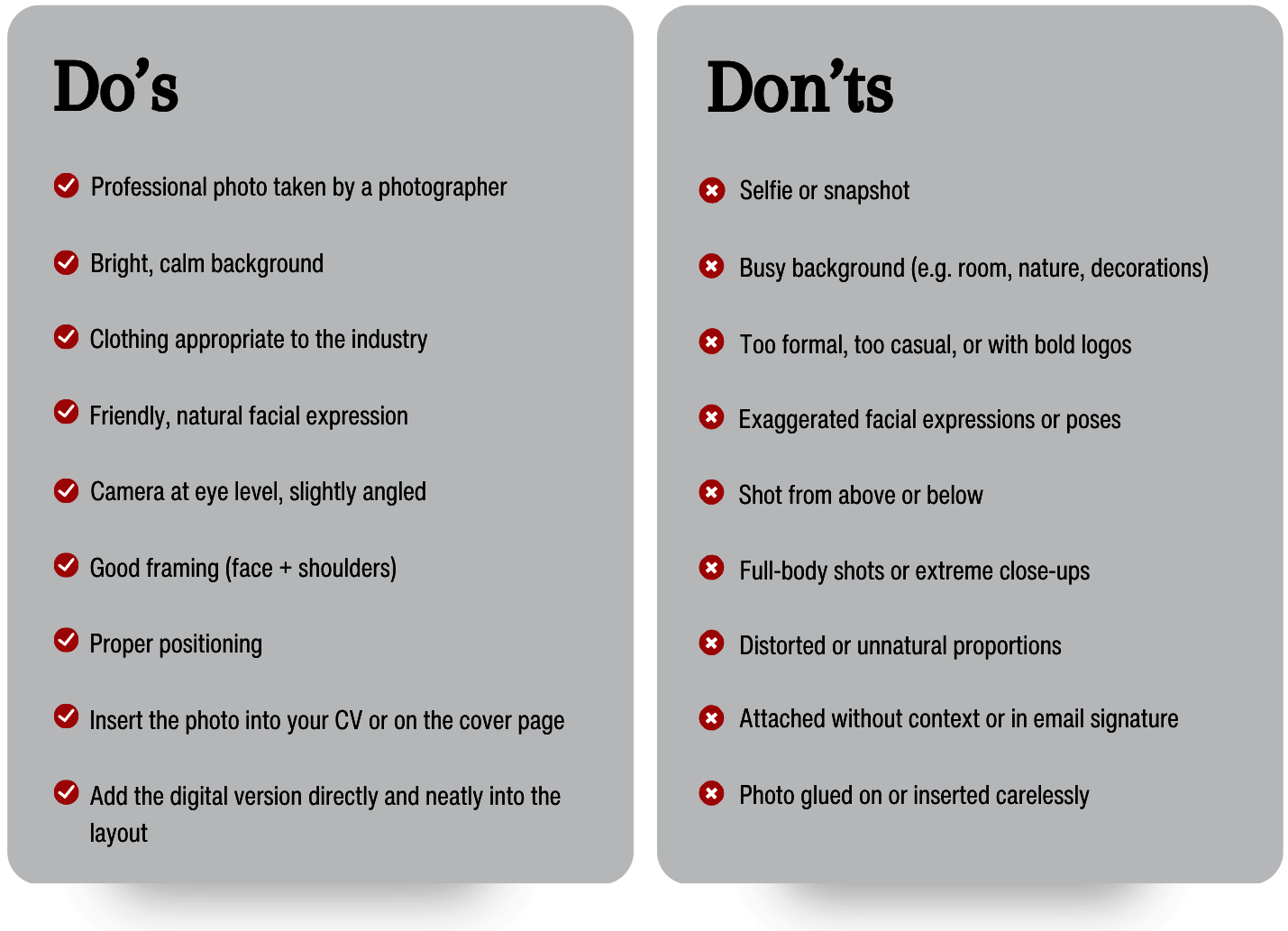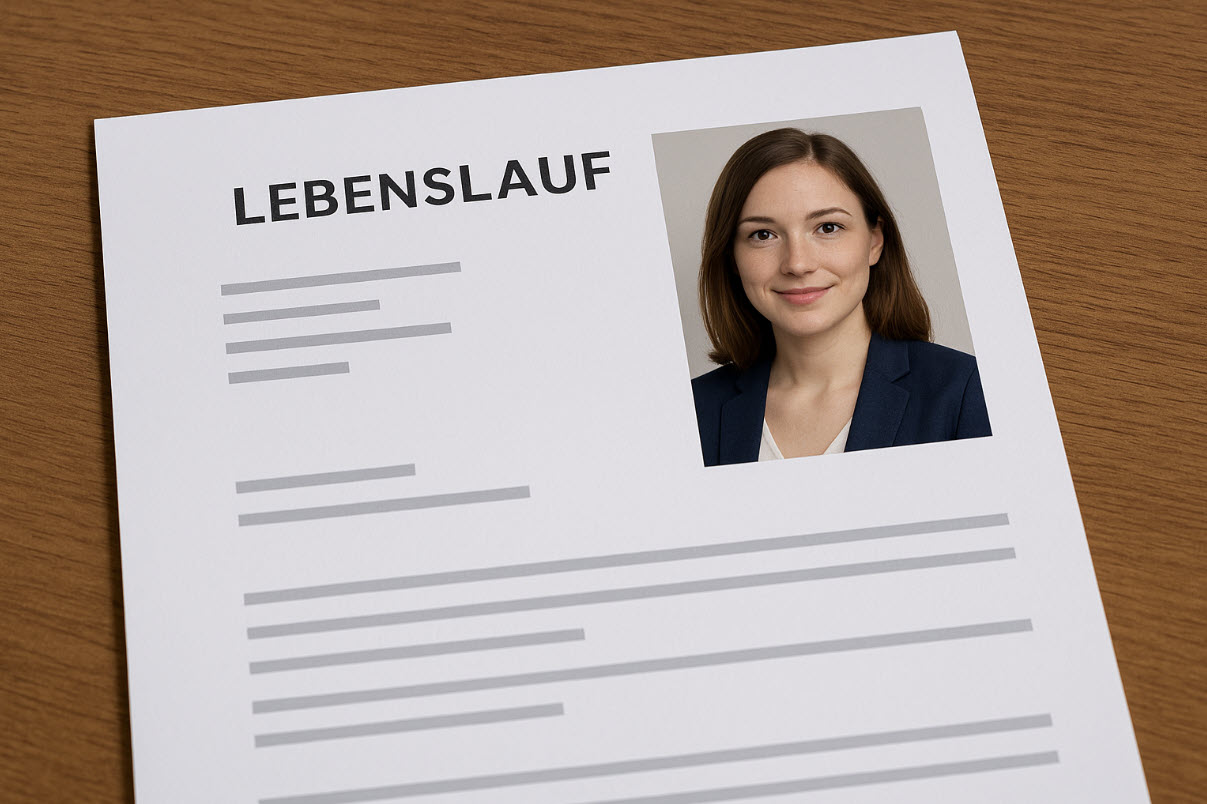Why Your Application Photo Still Matters
An application photo isn’t mandatory — and under anti-discrimination laws such as the Austrian Equal Treatment Act (GlBG), employers are no longer allowed to require one. Still, it offers a quick first impression that can be helpful in the selection process. Whether you're applying for a technical position, an apprenticeship, or a management role: your photo is often the very first thing a hiring manager will notice. Before they even glance at your CV, their eyes go to your picture. And first impressions count — like it or not. Your resume might be excellent, but if the photo looks awkward, blurry, or out of place, it might leave a poor impression.
You don’t need to look like a model. But a friendly, professional photo instantly shows:
- You're motivated
- You approach things seriously
- You’ve made an effort
A clean, well-done photo can be a small gesture with big impact: it shows you’ve thought things through and want to make a good impression. Whether you come across as calm, confident, curious, or detail-oriented – a photo reveals a lot. And that helps recruiters form an initial gut feeling. A photo doesn’t replace an interview, of course — but it does help them get a first sense of who you are. And if you look likeable, you’ve already scored your first point.
What a Strong Application Photo Should Look Like – The Essentials
There are no strict rules about how your application photo must look — but it should always be professional, authentic, and appropriate for the position you're applying for. A good photo doesn’t just look neat — it also says something about you. To truly make an impression, pay attention to the following:
- Recent – Not older than 1–2 years
- Professionally taken – Ideally by a photographer; no selfies, vacation pics, or casual snaps
- Light, neutral background – White, grey, or soft tones that keep the focus on you
- Clothing appropriate to the industry – Clean, simple, no flashy patterns
- Friendly expression – Open and pleasant, not exaggerated
- High quality – Sharp, well-lit, no filters, no facial shadows
- Portrait format – Head and upper torso only; full-body shots feel too distant
- Straight or slightly turned – Eye-level camera angle, not from above or below
- Format & size – Ideally portrait, around 4:5 or 3:4; digital version about 500x650 pixels; landscape format can also work with modern layouts (e.g., on a cover page)
Best placement for your photo:
- Top right or left corner of your CV (depending on layout)
- Alternatively on the cover page, if you use one
- Not in your email signature or attached separately
- Make sure it fits neatly into the layout – not too large, not too small
Tip: Many Word or Canva resume templates have a placeholder for the photo — use that as a guide.
How to Make Your Photo Work for You
Professional Doesn’t Mean Stiff
Tip: Tell the photographer what type of job you're applying for. That affects lighting, clothing, and posture. In technical fields, it can be a bit more relaxed than in finance or law.
Clothing: Appropriate, Not a Costume
Wear what you'd wear to an interview. For technical jobs, a simple shirt, clean blouse, or polo is often enough. Avoid logos or slogans — keep it neutral and well-groomed.
Avoid: Caps, deep necklines, graphic tees, or workwear with grease stains.
Expression & Posture: Friendly, Not Forced
Stand slightly angled to the camera, then look directly into the lens. Keep the camera at eye level — avoid shots from above or below, as they often look awkward or overly dominant. No forced smile, but a relaxed and friendly expression goes a long way. Imagine you’re greeting someone you like — that’s the look you want.
Pro tip: Take a deep breath before the shoot, think of something positive — it really helps.
Background & Lighting: Make Yourself the Star
The spotlight should be on you — not your living room wallpaper. Choose a calm, bright background. Natural light is great, but soft studio lighting works well too. Important: no clutter, no shadows on your face.
Unsuitable: Kitchen wall, bedroom, party lights, garden fence
Suitable: Grey, white, or bright background without distractions
Taking the photo at home? It can work with some effort — but selfies, webcam shots, or vacation pics are definitely not recommended.
You don’t need to be a pro photographer — but a professional, friendly photo helps you make a strong impression even before the first interview.
Bottom line: It’s worth the effort. Because in the end, it’s not just what you can do that counts — it’s also how you present yourself.

